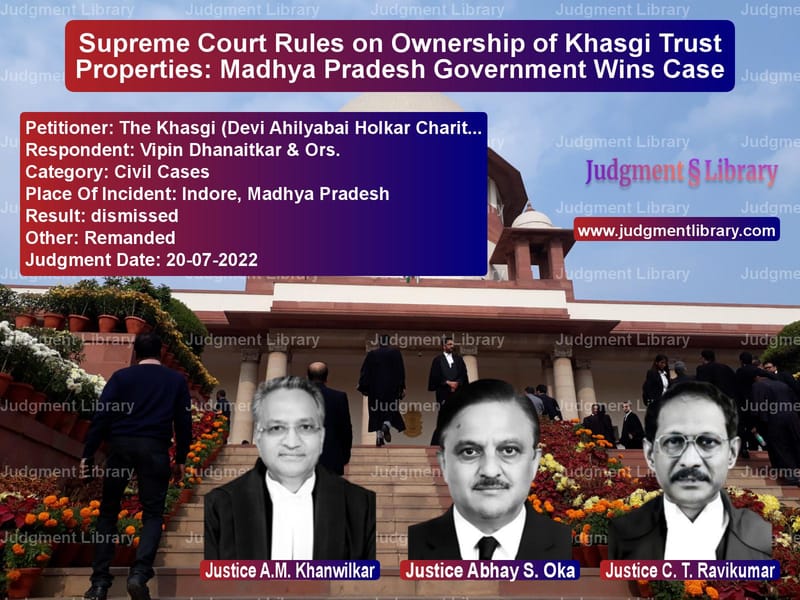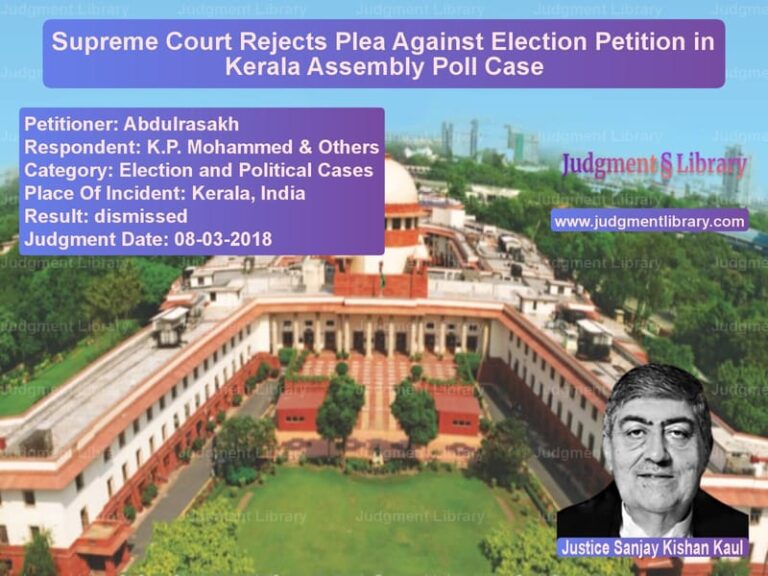Supreme Court Rules on Ownership of Khasgi Trust Properties: Madhya Pradesh Government Wins Case
The case of The Khasgi (Devi Ahilyabai Holkar Charities) Trust, Indore & Anr. vs. Vipin Dhanaitkar & Ors. is a significant legal battle concerning the ownership and control of properties originally owned by the Holkar royal family of Indore. The Supreme Court’s ruling, delivered by a bench comprising A.M. Khanwilkar, Abhay S. Oka, and C.T. Ravikumar, settled the long-standing dispute over whether certain properties claimed by the Khasgi Trust belonged to the Trust or had vested in the Madhya Pradesh Government.
Background of the Case
The dispute arose from the properties of the erstwhile Holkar dynasty. Upon the merger of princely states, an agreement known as The Covenant was signed on October 30, 1948, between the rulers of Gwalior, Indore, and other states to form Madhya Bharat (later part of Madhya Pradesh). Under Article XII of the Covenant, the rulers were entitled to retain their private properties, distinct from state-owned properties.
The central dispute was whether the properties listed under Part B of the Khasgi Trust were private trust properties or whether they had lapsed to the state government as part of the agreement. The Madhya Pradesh Government argued that these properties had been transferred to the state under the 1949 agreement between the Government of India and the Holkar ruler, while the Khasgi Trust claimed ownership and control over the assets.
Legal Issues in the Case
- Did the Khasgi Trust have ownership over the properties listed under Part B?
- Were the properties vested in the Madhya Pradesh Government under the terms of the 1949 agreement?
- Were the trustees of the Khasgi Trust authorized to sell properties under the 1972 Supplementary Deed?
- Was the Madhya Pradesh Public Trusts Act, 1951, applicable to the Khasgi Trust?
- Was the Economic Offences Wing inquiry against the trustees legally valid?
Arguments by the Petitioner (Khasgi Trust)
- The Trust argued that it was created to manage properties set aside for religious and charitable purposes, as per the original wishes of the Holkar rulers.
- The properties under Part B were trust properties and had never vested in the Madhya Bharat Government.
- The 1972 Supplementary Trust Deed gave the trustees the authority to alienate trust properties, meaning sales of properties were legal.
- The Madhya Pradesh Government never contested the ownership of these properties for more than five decades, acknowledging the Trust’s control.
- The Public Trusts Act was inapplicable as the Khasgi Trust was a state-controlled trust.
Arguments by the Respondent (Madhya Pradesh Government)
- The properties listed in Part B had lapsed to the Madhya Bharat Government as per the agreement between Maharaja Yashwantrao Holkar and the Government of India.
- The state provided funds in perpetuity for the maintenance of the religious and charitable properties.
- The 1972 Supplementary Deed was invalid because it attempted to alter the ownership of properties already vested in the state.
- Trustees had sold properties without seeking permission, violating the Public Trusts Act.
- Illegal sales of trust properties needed investigation by the Economic Offences Wing.
Supreme Court’s Observations
- The properties listed under Part B of the Trust had lapsed to the State Government under the settlement agreement of 1949.
- The Government of India had rejected Maharaja Holkar’s claim over these properties, categorizing them as state-owned.
- The Khasgi Trust was created to manage religious and charitable institutions, but it did not own the properties.
- The 1972 Supplementary Deed could not override the legal ownership of the state government.
- All sales of properties conducted by the Trust without state permission were unauthorized and invalid.
The Court ruled:
“The Khasgi properties and the income from the Khasgi shall be treated as lapsed for all time to the Madhya Bharat Government.”
Final Judgment
The Supreme Court issued the following directives:
- The Khasgi Trust is a Public Trust under the Madhya Pradesh Public Trusts Act, 1951.
- The Trust must be registered under the Public Trusts Act.
- The properties listed under Part B of the Trust belong to the state government and cannot be sold without approval.
- The 1972 Supplementary Trust Deed does not grant the power to sell properties without government permission.
- The Madhya Pradesh Government must take steps to recover illegally sold properties.
- The Economic Offences Wing inquiry against trustees was set aside, as there was no evidence of criminal intent.
Impact of the Judgment
- The ruling affirms that royal properties merged with the Indian Union cannot be privately held unless explicitly granted.
- Charitable trusts managing religious endowments are subject to public trust laws and government oversight.
- Illegal alienation of trust properties can be investigated and reversed.
- It strengthens state control over historic and cultural properties.
This landmark ruling protects public assets from unauthorized sales and sets a precedent for similar cases involving princely state properties across India.
Petitioner Name: The Khasgi (Devi Ahilyabai Holkar Charities) Trust, Indore & Anr..Respondent Name: Vipin Dhanaitkar & Ors..Judgment By: Justice A.M. Khanwilkar, Justice Abhay S. Oka, Justice C. T. Ravikumar.Place Of Incident: Indore, Madhya Pradesh.Judgment Date: 20-07-2022.
Don’t miss out on the full details! Download the complete judgment in PDF format below and gain valuable insights instantly!
Download Judgment: the-khasgi-(devi-ahi-vs-vipin-dhanaitkar-&-o-supreme-court-of-india-judgment-dated-20-07-2022.pdf
Directly Download Judgment: Directly download this Judgment
See all petitions in Property Disputes
See all petitions in Public Interest Litigation
See all petitions in Judgment by A M Khanwilkar
See all petitions in Judgment by Abhay S. Oka
See all petitions in Judgment by C.T. Ravikumar
See all petitions in dismissed
See all petitions in Remanded
See all petitions in supreme court of India judgments July 2022
See all petitions in 2022 judgments
See all posts in Civil Cases Category
See all allowed petitions in Civil Cases Category
See all Dismissed petitions in Civil Cases Category
See all partially allowed petitions in Civil Cases Category







